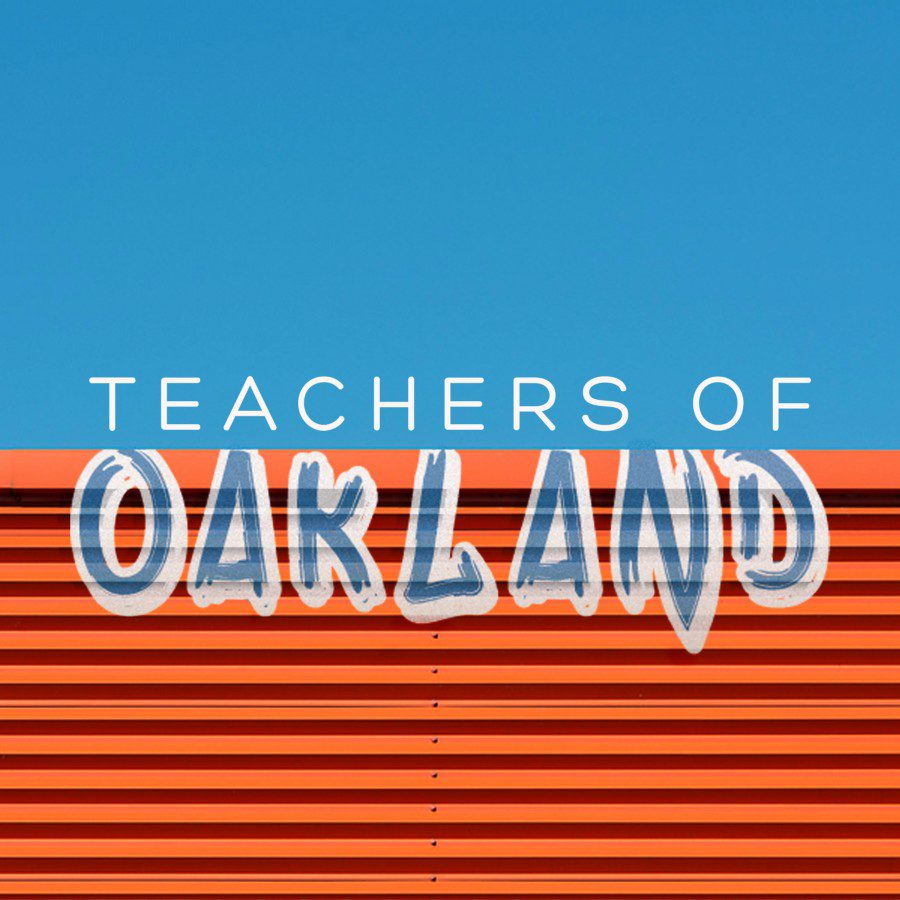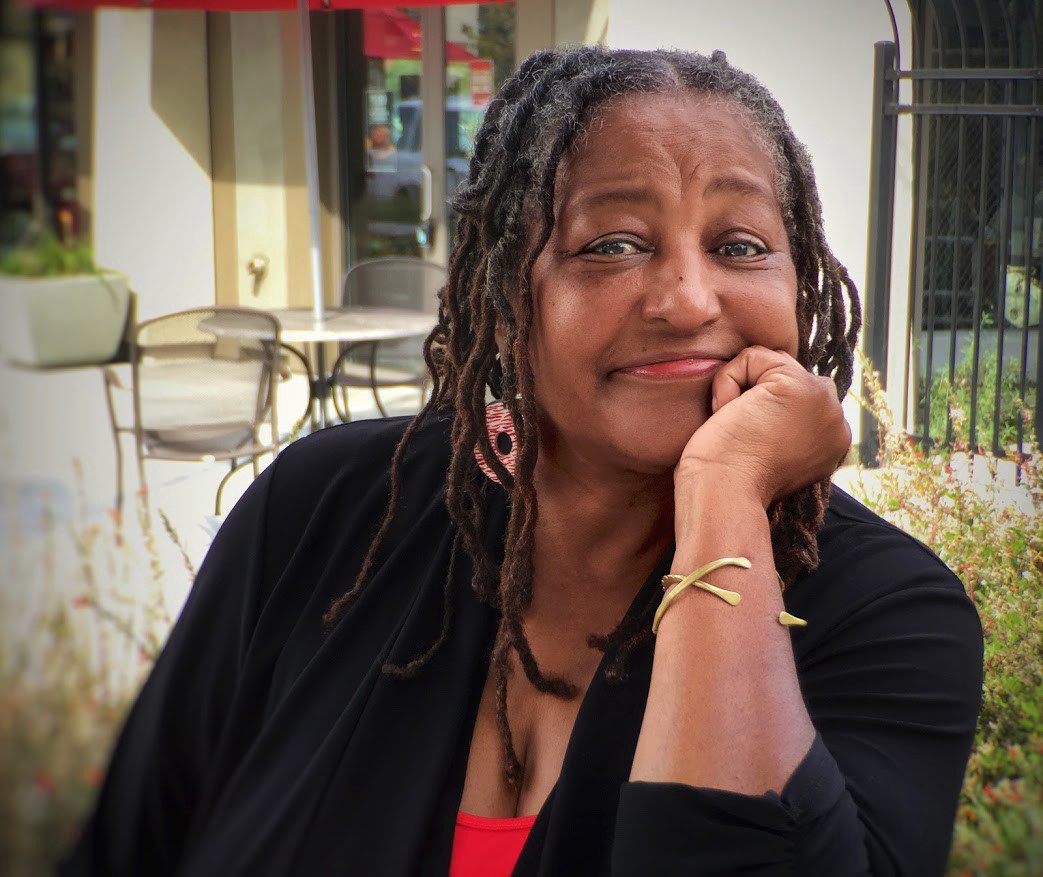
This post originally appeared on Medium on May 7.
The little ones crawled over me with eyes innocently wide, unable to hold back their gasps. “Not Norman!” they echoed. Not Norman!
I looked up from the pages of the children’s book in my hand, stepping out of body for a moment to appreciate the absurd love of the situation. 15 toddlers were baring their souls in the way only small children can. They held back nothing in their love for me, a stranger in their classroom, as they tugged on my beard and strained to get a better look at the pictures on the page. I looked to the Head Start teachers behind them, watching both their students and me with disarming affection and a sense of wholeness. I looked at myself, my best self, completely child-like and absorbed in that entire scene. And I felt at peace. No matter that we followed up reading about our new goldfish friend by snacking on Goldfish® Crackers.

Spotted: “Not Norman” in a KG classroom in Oakland! |
That moment is clearly etched in my memory. It’s one of several from my time in Memphis with Porter-Leath, a long standing community organization, but that was the moment I go back to often. That was when I first started asking myself — why did I feel that sense of belonging and joy so deeply? From where did that gratitude rush in?
It was the teachers.
There is power in being in the company of inspired people. I’ve felt it at various times in my life — most notably when I am in practice with my faith and am around my spiritual gurus and fellow seekers. There’s a purity in that experience, of human beings aligning their actions and thoughts with something deeper. For those of faith, it might be God. But it shows up in other ways, too — as flow, or being in the zone. I’ve felt it on stage in front of a mike and in the middle of pickup basketball games. I experienced it when I read Harry Potter for the first time, and when I sat on a bench with my partner during a recent weekend trip away, staring at redwoods and listening to the vibrant crackle of the moss. It was that rich non-being, where my emotions, thoughts, and actions were beautifully aligned, and I didn’t feel like “something was off.”
When I reflected on my career up to that moment in Memphis, I had yet to sustain that alignment for longer than moments, hours, perhaps days. And yet, when I spoke with the Head Start teachers that day, and many other teachers across that year, I consistently heard them talk about their living out their purpose on this Earth. Daily challenges and obstacles existed (along with systemic challenges around support and value), of course, but they got into their work and stayed in because they were aligned with their higher sense of purpose. For some, it was their Faith. For others, it was a responsibility to the community that raised them. But I just felt — it really was more a feeling than an intellectual exercise — the inspiration driving them. And it brought out something better in me. I was around people who were grateful, aligned, and pouring into others. They showed care and courage daily, guiding young people around them onto higher planes and activating the constant flow of love around them.
I’m not in the habit of placing teachers on an unfair pedestal. It can be dangerous, and is an irresponsible use of my platform. But these teachers were embodying the values I hold dearly — service, gratitude, love, leadership — and I was inspired.
I am courageous.
I left Memphis in 2016 and moved to Berkeley, California, to start my MBA at the Haas School of Business. I knew that my time in Memphis, enabled by an Education Pioneers Fellowship, had fundamentally shifted my trajectory from the one I stared at in my previous consulting career. I had confirmed my hypothesis that education, as a focus point for access and equity, was my path. I didn’t know, however, what my role was in this new world. I knew of the teacher-administrator path, but I learned of the incredible depth and breadth of roles that contribute to healthy education in communities. As I moved into South Berkeley, I didn’t yet understand where I could be of best use, given both my strengths and growth areas. So, I interned at Oakland Unified School District over the summer to get a sense of my new community. I leaned into Oakland and the East Bay through mentorship programs. I listened to and learned from friends who grew up here.
I also asked about our history. And, as the quip attributed to Mark Twain goes, “history rhymes.” Listening to people in Oakland talk about our local education was an exercise in both energy and frustration. Energy because, especially in Oakland, we stand on the shoulders of giants. From the Farm Workers movement to the Black Panthers, from anti-war protests to the free-speech movement, from the Occupy movement to #BlackLivesMatter, Oakland has long been a focus point of fights for justice and civil rights. This showed up repeatedly in the macro narratives of our community and the individual stories of inspiration I heard. But there was frustration, too. We’re still fighting for so much of the same things as those before us. In the education community, there are still massive inequities in student achievement, teachers still aren’t supported relative to their needs, and communities are still deeply siloed — racially, socioeconomically, politically, even in their visions for justice.
As a deep — deep — empath, it’s hard for me to hold these stories of injustice and inequity and hate and conflict. It’s the privilege of the privileged to only have to feel these things second-hand, but I feel them nonetheless. Fortunately, my Berkeley-Haas community were the warm demanders I needed at this junction of purpose, inspiration, and uncertainty. Educators and social justice advocates in my class encouraged me to do something about the inequity around me, while reminding me they’d be there to support me when I misstepped. I considered the role I could play, the resources I brought and the service I could provide. Mentors reminded me that it is not my role be the face of some kind of reform, but rather to support and amplify work that was already being done in a way that was both respectful of the veterans in the work and brought new energy. I had to find the balance of acknowledging my worth, belonging, and knowing how to lead with humility and courage.
So I started Teachers of Oakland.
I like to reflect on the perfect storm in my life as I considered my next move. I was reading 2 books: Ross Baird’s “The Innovation Gap” and Brené Brown’s Braving the Wilderness. I was consulting with a friend, Deron Hall, on his vision to empower and serve the underestimated. I was obsessed with Hamilton, and specifically, My Shot. And, frankly, I wasn’t finding good fits in the job market (…and good fits weren’t finding me).
So I stepped back from this perfect storm and looked at the pieces like a puzzle solver looks at the next few fits of a long-term project. Baird was teaching me to think about who, and where, we look to for innovation and brilliance. Brown was teaching me to belong to myself and consider standing in the wilderness. Deron always pushes me to manifest my purpose. And Lin-Manuel Miranda, as he’s done several times a month since, was inspiring me to believe in an ideal so deeply so as to change the world.
I talked to my family and my partner. I reflected on the advice my father often gave me: “we brought you here [to America] to give you a higher launching pad, so you could launch higher than we ever could and be successful.” I thought about our discussion on that phrase a few years earlier, when I left Deloitte for Memphis, and how we agreed to change the definition of my success and keep the rest of the advice intact. And I said — let’s go for it.
Let’s start a non-profit-tech-storytelling-narrative-shifting-community-organizing-start-up.

I woke up to an email from Jacob with what became our Logo. |
And so, I started Teachers of Oakland. As doubts rushed in to fill the wilderness, Erin introduced me to her aunt to be our first featured teacher. Chen gave me his old voice recorder for interviews. Michael gave me some fundamental tips on photo editing platforms. Richa taught me the basics of using social media to build community. 2 days after I told him about what I was manifesting, Jacob emailed me with what is still our primary logo.
I talked to friends and colleagues from Oakland Unified School District, GO Public Schools, and Oakland Education Association, and they introduced me to our first dozen teachers. Who then introduced me to my next dozen. We were off. What started as a side project, a personal connection and storytelling effort, was turning into something others wanted to be a part of. And why not? We were amplifying incredible people in our communities, who happened to be teachers, and sharing stories about love and courage and family and justice. We were connecting people to each other in a steady, positive, human way. I was back in that company of the inspired, listening to folks in my community share their struggles and challenges, while acknowledging their deep sense of purpose. I was learning to listen, to hold space, to be grateful, to amplify, and to connect — all at a whole new level.
They say an entrepreneur is more likely to succeed if they are trying to solve a problem they personally experienced.
I liked that advice when I first heard it. A mom probably knows more about motherhood than someone who’s never been a mom. An immigrant probably knows more about the challenges of immigration than a native. It makes intuitive sense.
But I’ve never been a teacher. I’ve supported and worked with teachers, yes, but what did I know about what a teacher needs and appreciates? I could do 100 interviews (we’re at 140) and still not have the same depth of experience as someone who’s actually committed to that profession.
Was I sunk? Had I started something I had no business starting?
Closing the Empathy Gap
I couldn’t square the incredible difference between my personal experience around teachers and the headlines I read. The vitriol that flew back and forth between the education community and the rest of our society was rough. The conversation within the education community was even rougher.
There are experts and pundits who think about the structures and policies we need to strengthen to build a more just society. I agree with lots of their policy proposals, and I disagree with some. I certainly am building my resiliency to extremes and am learning to love the nuance. One thing I don’t tolerate, though, was the disrespect and dehumanization of folks in the work. There are bad teachers, yes. When it comes to the potential stability of a child, we must have the conversation about preparing and supporting teachers to be excellent in their craft. But, it feels like the loudest narratives skew absurdly against teachers — sometimes from outside the public education community as a diatribe against the inefficiencies of public systems — and sometimes from people who are, themselves, deeply in the work. The distrust and distaste for teachers comes from somewhere, I’m sure. Maybe folks had bad experiences, and maybe we’re all just frustrated by the lack of progress in our gap-closing work. But the idea that teachers are enabling that stagnation was disheartening.

How we value teachers might be based on how we understand systems. |
Partially enabled by the exclusive idea of rockstar teachers somehow getting students to grow as ‘roses in concrete,” partially by the fact that teachers were dropping out in severe percentages, and finally by the convoluted idea that teachers who were in the classroom for several years but were not pulling student scores up should be replaced, we started believing that teachers were somehow holding students back in a broader system that was set up for them to succeed.
What if we changed our fundamental assumptions about those closest to the work? The folks who have by far the most impact, as far as education professionals go, on our young peoples’ trajectories? What if we started from a place of appreciation and respect and gratitude for the humans who chose to become teachers?
Would that, in itself, solve our problems? Hell no. It was never going to be that easy. But if we started from that place of amplification of the good, and got enough people to meet our their local teachers, might we have a very different conversation? And does not conversation, when bundled together as public discourse, impact policies, tools, public action? And do those things not legitimately lead to systems change? Our systems were built by people who started with some fundamental assumptions. One look at the funding structure of our public school system, and we can surmise that the assumption wasn’t gratitude, empathy, and respect. And I get it — once you’re siloed by our excellent-at-siloing social structure, it’s easy to disproportionately remember the negative, the personal affronts, the places where folks fell short. So I’m challenging myself, and our society, to consider: what if we broke down the walls keeping us from each others’ humanity? And, since it’s unrealistic to get our whole community to get into classrooms to listen to our teachers (for now), what if I bring the teachers to you? Would you still typecast teachers if you knew them personally?
I am guilty of typecasting from a distance. It’s easy to lob blame-bombs at name-less, face-less entities who you don’t know. Let’s be real — I’m doing it all the time across lines of political, cultural, educational, and socioeconomic difference. I have a huge empathy gap.
So I guess I’m not sunk. I have lacked gratitude. I have felt alone. I have craved community and longed for belonging. I have disregarded or dehumanized the formless neighbor.
Turns out — I have personally experienced the problem I am trying to solve.
We must be bold.
This is different. It’s hard to really measure the impact of a storytelling and empathy-gap-closing organization beyond reach and engagement — metrics media companies mostly use right now. But we’re building the base for the long game. We’re learning. We’re ebbing and flowing as we grow and trying to find a sustainable, meaningful model. But we will! We must! And look, this is hard. I’ve had days when I wanted to throw away the entire playbook. I’ve had days when I feigned apathy as a shield to keep away the uncertainty of the wilderness. I’ve had days when I thought I was just wasting my — and teachers’ — time.
But what kept me going was that next interview. Learning how Randy is growing in his understanding of masculinity. Hearing Stella talk about how her mother, and grandmother, were teachers and helped found schools for their local Black community. Listening to Mr. Brown recount his childhood watching Malcolm X on the News. Holding the space for Nakachi to put out in the world what she’s proud of about herself. Smiling as teacher after teacher told me about how there’s something here, something in being a teacher in this town, at this time, that reminds them of their true purpose on this Earth.
I’m in the company of the inspired. I’m in the company of Teachers of Oakland.

Stella Gums | Retired | The Teachers of Oakland Pioneer |
By Om Chitale, May 8, 2019
